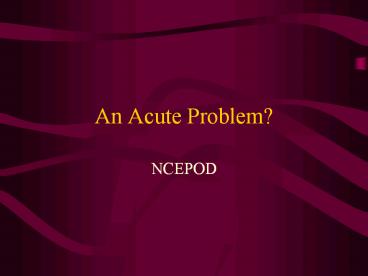An Acute Problem? - PowerPoint PPT Presentation
Title:
An Acute Problem?
Description:
An Acute Problem? NCEPOD Paul F Jenkins Consultant in Acute Medicine, Norfolk and Norwich University Hospital President of the Society for Acute Medicine UK SAMUK The ... – PowerPoint PPT presentation
Number of Views:121
Avg rating:3.0/5.0
Title: An Acute Problem?
1
An Acute Problem?
- NCEPOD
2
Paul F Jenkins
- Consultant in Acute Medicine, Norfolk and Norwich
University Hospital - President of the Society for Acute Medicine UK
3
SAMUK
4
The Sub-Specialty of Acute Medicine
5
An Acute Problem
- Interpretation of the data
6
Interpretation of the data 1.
- Complete data obtained in 1154 (68) of 1677
cases - i.e. 7.4 patients per participating Hospital
throughout the 1 month trial period - Average medical intake in England and Wales is
now 40 Patients in 24 hours - Proportion of medical patients requiring
intensive care is small (0.6)
7
Interpretation of the data 2.
- 10 of the patients had incompletely recorded
histories and/or physical examination but - 43 patients were referred direct from AE
departments - It could be that an appropriate emphasis was
placed on physiological assessment rather than a
detailed history - May explain lack of consultant physician review
before ICU admission
8
Interpretation of the data 3. (standard of
pre-ICU care)
- 90 had an acceptable history
- 87 had a complete clinical examination at 1st
contact - 93 had a diagnosis at initial review
- 90 had a correct diagnosis
- 87 had an initial treatment plan and this was
followed in 96 - Treatment deemed prompt and appropriate in 58
(should read 74)
9
SAMUK
- Welcomes NCEPOD involvement in acute medicine,
- Recognises the need for organisational change and
- Appreciates support for the role of the Acute
Physician. - However, correction of errors should involve a
no blame culture. The failure is usually in the
system, not the individual.
10
In particular
- Ensuring that Junior Clinicians achieve
competency in dealing with the unstable patient
MMC, IMPACT and ALERT courses - Adequate and informed documentation of
physiological parameters - The importance of recognising changes in these
and responding to them - Senior support and supervision essential
11
The Acute Medical Unit
- Is focussed to the recognition and treatment of
the acutely ill patient - Is not just about triage
- Resources and skill mix can be audited
- Team-working is facilitated
- The multi-professional approach can be engendered
12
Future Development
- Integrated Front-door and Critical Care
Services.. Streaming , not Departments - Banish traditional specialty boundaries in the
care of the critically ill - Develop a breed of Urgent-Care Clinicians..to
support - ..a Hospital-wide service
13
The Acute Physician Training
- Current SpR Training Programmes
- Urgent need for more trainees..this means
appropriate numbers with associated funding - Interest among Junior Clinicians is growing
14
The Acute Physician Role and Rota
- Direct supervision of junior medical and nursing
staff this offers an ideal training opportunity - Early senior review of all presenting patients,
not just the critically sick - Appropriate management planning
- Timely (and cost-effective) investigation and
treatment
15
The Acute Physician Role and Rota
- The concept of senior support
- The necessity for sustainable working patterns
and therefore - shift work
- An opportunity for flexible and part-time working
16
However,
- One pattern will not fit all
- The successful introduction of Acute Physicians
will take time - The acute role of the Specialist Physician
remains vital and their enormous contribution to
the Acute Intake must be recognised
17
Professional Interfaces
- Acute Medicine
- Specialist Medicine
- Intensive Care Medicine
- AE Medicine
- Surgical specialties
18
In Summary
- This report offers valuable information
- There is an urgent need for organisational change
- There are training and resource issues
- There is a wonderful opportunity to change the
way we care for the critically illfor the better
- Traditional Specialty boundaries should be
challenged with competency being the fundamental
principle
19
NCEPOD, An acute problem
- Should be congratulated on addressing this issue
- There are questions to be answered
- Future development must embrace a No-blame,
learning culture - We all want the same thing
- Premier Quality Care for Patients































